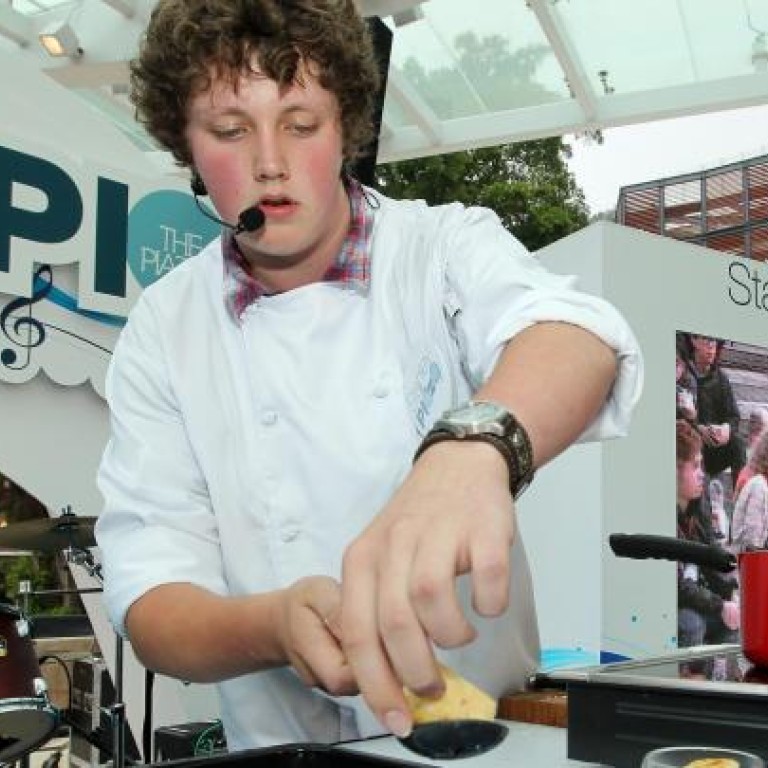
Junior chef blends food and science
Inspired by Heston Blumenthal, a young chef's culinary passion is taking him around the world, writes Chris Lau
The fact that young Jack Lark has a zeal for food isn't entirely surprising. After all, he was among the four finalists in the first Junior Masterchef Australia contest in 2010. Less well known, however, is his interest in science. "I have a passion for science, forensic science, in particular," he says.
That may explain why Jack's idol and inspiration is British celebrity chef Heston Blumenthal, whose brand of culinary creativity rather resembles science experiments. The teenager from Hobart regularly tries out Blumenthal's recipes and besides impressing judges with his recreation of the chef's snail porridge, whipped a Christmas pudding featuring hidden candied clementines for his family this year.
Hong Kong viewers who followed the reality show will know Jack didn't win Junior Masterchef Australia (the title went to Isabella Bliss from Queensland). But the competition has opened up a world of opportunities for him.
Now a towering 15-year-old (he's grown to 190cm), Jack has since got to meet leading food producers in Tasmania and travelled around the world to culinary events, including a recent food challenge in Hong Kong.
Gastronomic interests run in the Lark family, so he has been introduced to all sorts of different flavours since he was little.
"His dad and I are really interested in food, too," says Lyn Lark, who accompanied her son to Hong Kong. (Lyn and her husband Bill run Lark Distillery, which makes a range of fruit liqueurs and is said to be pioneering a whisky revolution in Australia with its single malt.)
The food exposure aside, household rules in the Lark home perhaps also contributed to Jack's extraordinary cooking skills.
"If we have a dinner party at home or something, our rule is if you cook, you don't have to clean. Jack didn't like cleaning, so he learned how to cook very quickly," Lyn explains.
"But he always has a very good nose and a good understanding of all the flavours."
Jack started cooking seriously when he was nine, after watching , the movie about down-in-the-dumps blogger Julie Powell's attempt to cook every recipe in Julia Child's first cookbook within a year.
He picked up a few of Child's cookbooks, began trying out her French recipes, and immediately fell in love with French food: "What got me in was Julia Child and her cookbook, ."
"I love the cream and butter," Jack confesses as his mum bursts into laughter over his obsession with rich French sauces.
But Lyn Lark had cultivated an environment that would forge her son's love for cooking long before he knew his way around a boeuf bourguignon.

"He was always interested in food anyway. I used to take him to places where I had meetings and he would eat off my plate. Then one day, he ate the whole dinner while I was talking, so I didn't get any."
When Jack sought permission to enter Junior Masterchef, Lyn Lark didn't give it much thought before signing the form - she thought he was just entering a neighbourhood contest in Hobart.
"He came to me and said, 'Mum, can I enter a cooking competition?' The next thing I knew, he was on TV," she recalls with a chuckle.
The popularity of the Junior Masterchef franchise around the world has persuaded many parents to give young children room to experiment in the kitchen. While they would previously have made the kitchen out of bounds as a hazardous area (all those sharp knives and hot stoves), the contest has shown what youngsters can achieve with proper supervision. After all, one of the four 2010 finalists in Australia was just nine.
"That's what amazed me about it because all of them are so into eating food, and learning everything about chefs, restaurants and general cooking," Lyn says. "I guess if you're really interested in it, it doesn't really matter what you're doing and where you are," she says.
Public attention on Jack these days is less intense compared to a couple of years ago. "It has died down a bit now. People sort of noticed me at school as soon as I got back," he says, recalling how some schoolmates would call him "Masterchef boy".
But he has been enjoying his globetrotting adventures, in particular a visit to London last year to savour his idol's culinary creations. Blumenthal, who runs The Fat Duck in Bray, invited him to dine at his three Michelin star restaurant.
They had hit it off when the chef visited Australia and gave Jack a slot on his stage show. "I had met him before in his Heston Blumenthal Live show. So I did one of those shows with him on stage."
And when Blumenthal shot a television series in Australia earlier this year, he again invited Jack to appear as a guest.
So, with his Junior Masterchef experience, does he hope to become a professional eventually?
"It's sort of a tricky question. I'm not sure 100 per cent what I want to be. I love food and it's always going to be an option," he says. Then again, so is forensic science although the University of Tasmania doesn't offer courses, he adds.
But if he were to become a chef, Jack reckons his kitchen would always combine food and science - just like his idol Heston Blumenthal.

